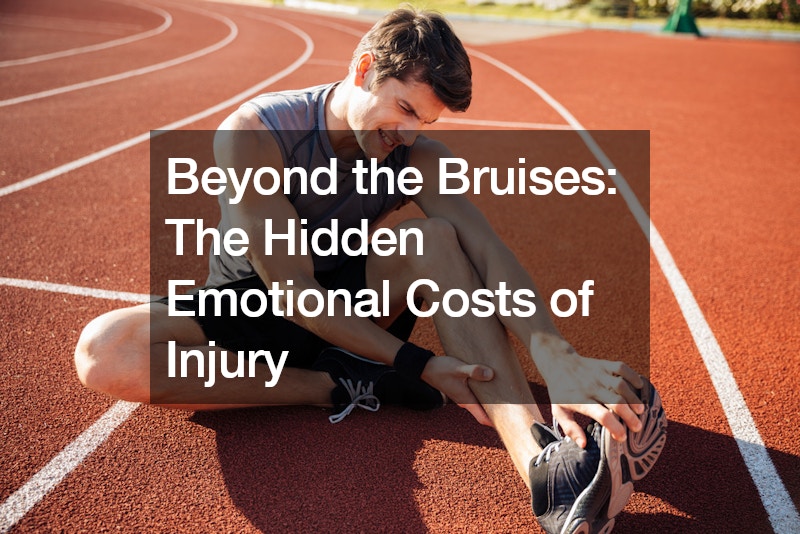Beyond the Bruises The Hidden Emotional Costs of Injury


The physical consequences of an injury are often readily apparent. Broken bones, cuts, and bruises can serve as constant reminders of the trauma experienced. However, the emotional impact of an injury is often overlooked, a hidden cost that can linger long after the physical wounds have healed. This article explores the emotional toll of injury and how a personal injury lawyer** can play a crucial role in supporting your emotional well-being during this challenging time.
The Emotional Rollercoaster of Injury
The emotional journey after an injury can be complex and unpredictable. Here are some common emotions individuals may experience:
Shock and Denial: The immediate aftermath of an injury can be characterized by shock and disbelief. Denial can be a coping mechanism, allowing the mind time to process the trauma.
Fear and Anxiety: The fear of the unknown, the uncertainty of recovery, and the potential for long-term disability can trigger significant anxiety. This can manifest as difficulty sleeping, panic attacks, and a general sense of unease. Anger and Frustration: Feeling angry at the person or situation that caused the injury is a natural response. However, anger can also be directed inward, leading to frustration and self-blame. Depression and Loneliness: The limitations imposed by an injury can lead to feelings of isolation and depression. Social activities may become challenging, and a sense of loss of identity can emerge. Post-Traumatic Stress Disorder (PTSD): In some cases, particularly when the injury is severe or life-threatening, victims may develop PTSD. PTSD is characterized by flashbacks, nightmares, and hypervigilance, significantly impacting daily life. The Impact on Relationships
The emotional toll of injury extends beyond the individual. Relationships with loved ones can be strained as the injured person grapples with emotional distress and physical limitations. Family members may become caregivers, adding stress and potentially creating resentment. Communication can suffer, impacting the emotional support network crucial for recovery.
The Role of a Personal Injury Lawyer in Emotional Healing
A personal injury lawyer cannot erase the emotional pain caused by an injury. Still, they can play a vital role in supporting your emotional well-being during this challenging time. Here’s how:
Validation and Support: A skilled personal injury lawyer will understand the emotional complexities of injury. They can validate your feelings and provide a safe space to discuss your anxieties and concerns. Reducing Stress: The legal complexities associated with personal injury claims can be overwhelming. A personal injury lawyer can handle the legal paperwork, medical records, and insurance negotiations, taking this burden off your shoulders and allowing you to focus on your emotional well-being. Financial Security: The financial repercussions of an injury can be significant. Medical bills, lost wages, and ongoing care costs can create immense stress. A personal injury lawyer can fight for fair compensation, helping to alleviate some of this financial burden and providing peace of mind. Resources and Support: Some personal injury lawyers work with mental health professionals, connecting clients with therapists or counselors who can address the emotional aspects of injury. These resources can be invaluable in promoting emotional recovery. Personal Injury Lawyer Perspective: Health Perspective
From a personal injury lawyer’s perspective, understanding the emotional impact of injury is crucial for effectively representing their clients. This includes:
Considering Emotional Damages: Beyond physical injuries, personal injury claims can also compensate for emotional distress caused by the accident. Lawyers need to gather evidence that documents the emotional impact on their client’s life, such as medical records from therapists or counselors. Promoting Healing: While legal battles are important, a personal injury lawyer should prioritize their client’s well-being. This includes advocating for medical care, rehabilitation services, and other resources supporting emotional recovery. Building Trust and Communication: An open and honest relationship with their client is crucial. A personal injury lawyer can provide supportive and empathetic legal representation by listening to their client’s concerns and emotional struggles. The Path to Healing
Healing after an injury is a multifaceted process that requires addressing physical and emotional wounds. While recovery may be long and challenging, resources are available to help. A personal injury lawyer can be a valuable ally, advocating for your rights and supporting your emotional well-being during this difficult time. Remember, you are not alone. By seeking help and utilizing available resources, you can navigate the emotional aftermath of an injury and start the journey toward emotional healing.
.
